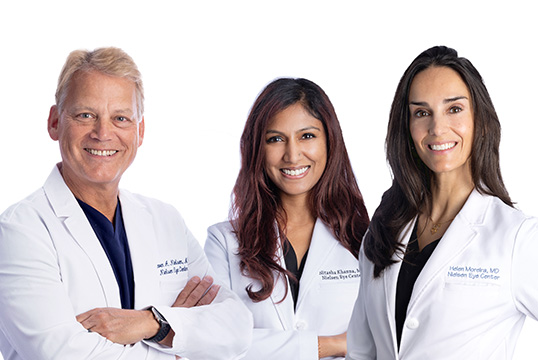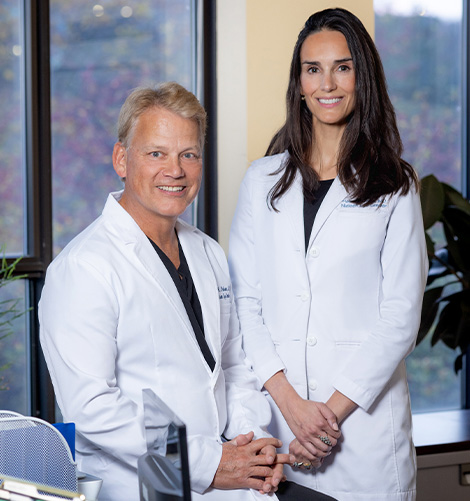Jump to Section
In some cases of injury, a corneal transplant may be needed. If you’ve experienced a corneal abrasion or disorder, our expert team can discuss your options for this advanced surgery.
Corneal Transplants
A corneal transplant, or keratoplasty, is a procedure to replace part of a damaged cornea with donor tissue. A cornea transplant can restore vision loss caused by keratoconus, Fuchs’ dystrophy, eye surgery complications, corneal ulcers, scarring, or infection.
The medical term for a traditional corneal transplant, also known as a full-thickness cornea transplant, is a penetrating keratoplasty (PKP). The PKP procedure replaces all five layers of the cornea with donor tissue. The goal of a full cornea transplant is to improve vision that is damaged as a result of corneal disease. However, due to the invasiveness of the procedure and the amount of tissue affected, traditional corneal transplants have longer recovery time and a higher risk of complications compared to newer procedures.
The Nielsen Eye Center is proud to offer two advanced corneal transplant procedures, DSAEK and DMEK, to residents of the greater Boston area, Quincy, Norwood Massachusetts, and the south shore. DSAEK and DMEK are faster, less invasive, and result in fewer complications than a traditional cornea transplant.
What is DSAEK?
DSAEK stands for Descemet’s Stripping Automated Endothelial Keratoplasty — it is one of the most advanced procedures for correcting corneal damage. Traditional corneal transplants can cause discomfort and many visual complications, as well as require many sutures. DSAEK decreases these problems by using donor corneal tissue to replace the two innermost layers of the cornea (endothelium and Descemet’s membrane), leaving the surface of the eye intact.
This changes what was once a very invasive procedure into a quicker one with fewer complications. Since less tissue is affected, the incidence of corneal rejection is virtually eliminated, and patients often see better and sooner than with the traditional corneal transplant method.
What is DMEK?
DMEK, or Descemet Membrane Endothelial Keratoplasty, is very similar to DSAEK, with one exception — the donor transplant does not include any tissue from the stroma layer of the cornea. Instead, the transplant is composed entirely of healthy donor cells from the endothelium, the innermost layer of the cornea. This results in a smaller, thinner layer of donor tissue for transplantation.
The biggest advantage of DMEK is that it involves the least amount of change to the patient’s natural cornea, as the size of the transplant is less than 1/5 the thickness of a human hair. DMEK can be more challenging to perform than DSAEK because of the fragility and size of the donor tissue. DMEK is also a newer procedure than DSAEK, so it is not as widely available. Our skilled team is one of the premier providers of this advanced procedure in the greater Boston area.
Benefits of DSAEK/DMEK
Compared with a traditional full-thickness cornea transplant, DSAEK and DMEK offer these advantages:
- Low risk of corneal implant rejection
- Low risk of long-term reliance on topical steroids
- Visual recovery is much faster
- Minimal restrictions on activities such as exercise or driving
- Minimal change to eyeglasses prescription
What Happens During DSAEK/DMEK?
Both procedures are performed in an outpatient surgical center where you will be mildly sedated, and your eyes will be numbed with drops. The eye surgeon makes a small incision through which they prepare and remove the innermost layers of the cornea. Through this same small incision, the surgeon inserts the donor corneal tissue.
An air bubble is then created to correctly place and maintain the position of the transplant. You will usually remain lying down for 10-15 minutes to ensure the donor cornea stays in place. Depending on the state of the corneal tissue after the procedure, the small incision will either be closed with 1-2 sutures, or it will be left to heal on its own.
What Happens After DSAEK/DMEK?
You will go home after the procedure, but you will be restricted to lying in bed with your face towards the ceiling for the rest of the day. Antibiotic and steroid eye drops are prescribed to reduce inflammation. Post-op exams and follow-up visits are scheduled for the first few days after the procedure to monitor healing and ensure there are no complications.
Request a Corneal Transplant Consultation
For more information on DSAEK and DMEK corneal transplants at the Nielsen Eye Center, contact the office nearest you. Our practice is proud to serve the greater Boston communities of Quincy, Weymouth, Norwood, and Norwell Massachusetts.
Frequently Asked Questions
Does cornea transplant change eye color?
How long after a corneal transplant can you fly?
How many times can you have a corneal transplant?
What happens if a corneal transplant is rejected?
Can a living person donate a cornea?
Are there artificial corneas?
Do corneal transplants last forever?
How long does it take to recover from a corneal transplant?
How soon can I drive after a corneal transplant?
Can I wear glasses after corneal transplant?
Can you have a second corneal transplant?
Is corneal transplant major surgery?
Who needs corneal transplant?
OUR PROVIDERS
Our team of eye doctors includes some of the foremost experts in laser vision correction and eye surgery in the greater Boston area. We look forward to helping you maintain healthy and clear vision for years to come. Learn more about our leading providers and the high level of service you can expect at the Nielsen Eye Center.
MEET OUR TEAM
DISCOVER OUR CONVENIENT
LOCATIONS NEAR BOSTON, MA
Schedule your appointment today at one of our four convenient offices situated on the South Shore. Serving the greater Boston area, our locations in Quincy, Weymouth, Norwell, and Norwood are here to provide exceptional eye care tailored to your needs.










